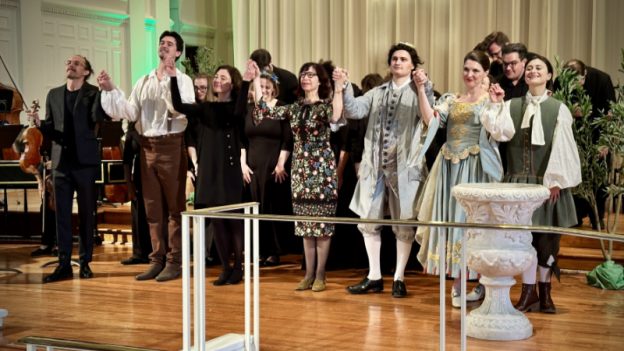November 14, 2025
Peachtree Road United Methodist Church
Atlanta, Georgia – USA
George Frideric HANDEL: Acis and Galatea
Julie Andrijeski, artistic director; Evan Few, concertmaster. Cast: Margaret Carpenter Haigh (Galatea), Michaël Hudetz (Acis), Andrea Walker (Damon), Michael Galvin (Polyphemus).
Andrew Alexander | 21 NOV 2025
Handel’s Acis and Galatea thrives in an atmosphere of intimacy, part pastoral opera, part oratorio, designed less for grand dramatic display than for elegant musical interplay. Atlanta Baroque Orchestra’s opening-night performance at Peachtree Road United Methodist Church leaned into that refinement from its first moments: a few suggestive pastoral elements, simple but elegant period costumes for soloists, and a modest ensemble of instruments on the church’s altar platform. The effect was tastefully understated, even lovely. But the sanctuary’s expansive, resonant dome presented a recurring challenge for music written to bloom in smaller rooms. What emerged, ultimately, was a warmly wrought evening in which the performers’ finesse often outshone the acoustical setting.
The ensemble, led from the concertmaster’s chair by violinist Evan Few, set the tone for the production. Few’s leadership was elegant and restrained, yet always touched with a subtle liveliness—a rhythmic spriteliness that gave the score gentle propulsion without tipping into briskness for its own sake. The orchestra’s sound was warm, refined, and articulately blended, its period-instrument colors blooming beautifully in moments when the space supported clarity. In other passages, the vast sanctuary blurred some of the ensemble’s detail, a reminder that Handel’s delicacy can be difficult to sustain in a room this large. Still, the musicians consistently shaped their lines with refinement, making a persuasive case for the work’s chamber-scale charms.
Among the soloists, Margaret Carpenter Haigh brought a bright, expressive presence to Galatea. Her singing balanced clarity with emotional openness, giving the role a centered warmth that anchored many of the opera’s most lyrical pages. Opposite her, Michaël Hudetz’s Acis was musically assured and thoughtfully phrased, though less of a dramatic focal point for much of the evening—a quirk of the role itself, which is surprisingly modest given its place in the title. His most affecting moment came not in a show of vocal brilliance but in the staging of his character’s death and transformation. Exiting slowly down the center aisle, a long train of gauzy blue fabric trailing behind him to signify the stream Acis becomes, he left behind a tableau both mythic and quietly moving.
The evening’s most unexpected highlight came from Andrea Walker as Damon, a relatively minor character whose Act II aria, “Consider, poor shepherd,” unfolded with striking beauty. Walker’s singing was agile, plaintive, and finely detailed—not emotionally oversized, but shaped with a bel canto-like emphasis on line and color. It felt like a sudden expansion within the work, a moment when the music seemed to momentarily glow from within. That it came from a supporting role only heightened its impact.
As Polyphemus, Michael Galvin offered a robust, richly colored baritone and a touch of theatrical swagger. His entrance—from the back of the church rather than the stage—created an unexpected dramatic jolt, announcing the giant’s arrival with both humor and intimidation. Galvin’s portrayal balanced comic exaggeration with real weight, embodying a character whose instinct is essentially to “throw rocks at the world until it’s better,” yet without undermining the music’s inherent grace.
The chorus, long one of Atlanta’s dependable musical strengths, sang with polish and admirable blend throughout the night. The chorus actually sounded best when they remained on the traditional choir chancel, where their blend and clarity could thrive without obstruction. When they moved forward toward the edge of the stage, some of that focus was lost to the upper reaches of the sanctuary. Even so, the closing chorus of Act I, with its buoyant, almost tongue-in-cheek optimism, landed especially well. Artistic director Julie Andrijeski deserves credit for shaping the choral and ensemble forces with coherence in a space not naturally suited to staged music-drama.
If the performance prompted any lingering reservations, they centered largely on the venue. Peachtree Road UMC is an undeniably beautiful sanctuary, but its scale and resonance made it difficult for such intimate forces to fully inhabit the dramatic world of Handel’s pastoral. The altar platform never quite became a theatrical space, and at times the room diluted the precision of both singers and players. It’s worth noting that the production’s subsequent performances at Glenn Memorial United Methodist Church (Nov.15) and Lassiter Concert Hall (Nov. 16) likely offered different acoustical outcomes.
Yet these limitations did little to diminish the evening’s deeper impression. Atlanta Baroque Orchestra continues to be a vital presence in the city’s early-music landscape, offering historically informed performances shaped with care, intelligence, and affection. This Acis and Galatea may have unfolded in a room larger than the work ideally deserves, but its musical rewards—refined ensemble playing, thoughtful solo turns, and moments of unexpected beauty—left a sense of gratitude. It was, in the end, a gently moving reminder of how small forces, handled with artistry, can still speak with clarity and heart. ■
EXTERNAL LINKS:
- Atlanta Baroque Orchestra: atlantabaroque.org

Read more by Andrew Alexander.







.png)